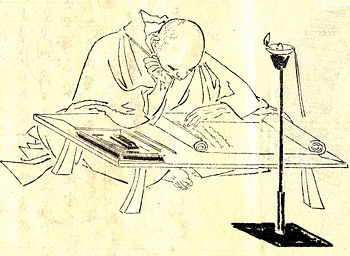Yoshida Kenko
Yoshida Kenkō (Japanese: 吉田兼好; Yoshida Kenkō; 1283?–1350?) was a Japanese author and Buddhist monk. His most famous work is "Tsurezuregusa" ("Essays in Idleness"), one of the most studied works of medieval Japanese literature. Kenko wrote during the Muromachi and Kamakura periods.
Life and work
Kenkō was probably born in 1283, the son of an administration official. His original name was Urabe Kaneyoshi (卜部兼好). He became an officer of guards at the Imperial palace. Late in life he retired from public life, changed his name to Yoshida Kenkō, and became a Buddhist monk and hermit. The reasons for this are unknown, but it has been conjectured that either his unhappy love for the daughter of the prefect of Iga Province or his mourning over the death of Emperor Go-Uda caused his transformation.
Although he also wrote poetry and entered some poetry contests at the imperial court (his participation in 1335 and 1344 is documented), Kenkō's enduring fame is based on Tsurezuregusa, his collection of 243 short essays, published posthumously. Although traditional translated as "Essays in Idleness," a more accurate translation would be "Notes from Leisure Hours" or "Leisure Hour Notes." Themes of the essays include the beauty of nature, the transience of life, traditions, friendship, and other abstract concepts. The work was written in the zuihitsu ("follow-the-brush") style, a type of stream-of-consciousness writing that allowed the writer's brush to skip from one topic to the next, led only by the direction of thoughts. Some are brief remarks of only a sentence or two; others recount a story over a few pages, often with discursive personal commentary added.
The Tsurezuregusa was already popular in the 15th century and was considered a classic from the 17th century onward. It is part of the modern Japanese high school curriculum, as well in some International Baccalaureate Diploma Programme schools.
See also
- Chance, Linda H (1997). Formless in Form: Kenko, "Tsurezuregusa," and the Rhetoric of Japanese Fragmentary Prose. Stanford: Stanford UP.
- Keene, Donald (1967). Essays in Idleness: The Tsurezuregusa of Kenko.
it:Yoshida Kenkō ja:吉田兼好 pl:Yoshida Kenkō
Credits
New World Encyclopedia writers and editors rewrote and completed the Wikipedia article in accordance with New World Encyclopedia standards. This article abides by terms of the Creative Commons CC-by-sa 3.0 License (CC-by-sa), which may be used and disseminated with proper attribution. Credit is due under the terms of this license that can reference both the New World Encyclopedia contributors and the selfless volunteer contributors of the Wikimedia Foundation. To cite this article click here for a list of acceptable citing formats.The history of earlier contributions by wikipedians is accessible to researchers here:
The history of this article since it was imported to New World Encyclopedia:
Note: Some restrictions may apply to use of individual images which are separately licensed.

